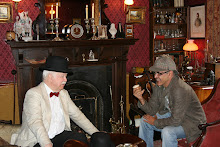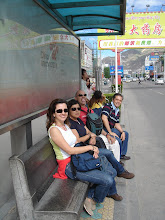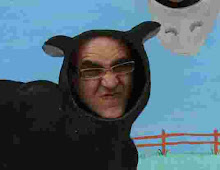Tibet can be told departing from its people, its monks and monasteries and its mountains. Being so, i just decided to tell you the story of this path through this 3 issues. I begin with People, today. Next weeks i´ll go into the other two.
People is the best that you can find in the world, i always believed that, and so when travelling, that´s what i look for. People to meet, their lives that i can imagine, the adventures to share. That´s my main goal, People and their environ instead of museums, cathedrals, ex-libris, or so...
The life of a person is made of simple paths to where some people converge and later diverge. Some are companions for a long journey, others stay for a short time, but what really matters is the way you walk your path together with its falls and stand ups or the grey or colourful times. Everything is important to your path to be true. As it was said before: There is no way to happyness. Happyness is the way. And that is really why i feel a happy person.
My Sherpa (Yan Su) in these lands just told me a story of her own experience that illustrates this perfectly. With 14 years old, she asked her father to go to his brother's for a month, during one month school hollidays. But instead of doing so she went to a monastery and ask the monks help to go to India to study what she felt like to. And so, she walked (in the right sense of the word) across the Himalayas and reach India by the time she had to be back home. Only then she send a message to the family. She stayed there for some years and then she came back to her home land to use the acquired knowledge. She told us that story with no remarks of an extraordinary adventure of thousand dangers. On the contrary she just presented it as a simple path that had to be "walked", during which she met a lot of good people along the way and how good it was for her own life.
I red again Tintim in Tibet (Hergé), 7 Years in Tibet & Reurn to Tibet (Heinrich Harrer), with whom i have a lot of affinities (the mountains, the climbing the love for the people, the way of thinking, the freedom of mind). And it is amazing the fidelity of their stories to the wise words of Dalai Lama. I really like the man, especially because he is just a simple man despite his political and "holy" condition. And so, i don´t resist to write down some of his toughts that really touch me deep inside:
...If we recognize the unique character of humanity, we´ll understand that diffrences are minor. T respect and care for others generates a hppy atmosphere and that is the way to create harmony and fraternity...
...As soon as we born we depend on the care of our parents. Later when we get sick or get old, again we depend on kindness of our brothers. So how can we forget that when we are in the middle?...
...In the old times, war was a matter of physical confrontation. The winner would see with his own eyes the suffering and the blood of the enemy. In our days it is much more frighten since a man on is office can push a button, kill millions of people and never get confronted with its atrocity.
Think about that.
Fallin at your feet (Bono, from the soundtrack of Million Dollar Hotel) it is my way to honour Dalai Lama and the Tibetians
O Tibete pode ser contado a partir das suas gentes, dos monges e seus mosteiros e das montanhas. Assim, decidi contar o meu trajecto por aqui através destes 3 pontos fundamentais. Começo pelas gentes, hoje. Nas próximas duas semanas darei a perspectiva dos outros dois
A vida de uma pessoa é feita de percursos para onde vão convergindo uns e de onde vão divergindo outros. Uns são companheiros mais à La Long, outros são pontuais ou efémeros, mas isso pouco importa. O que importa realmente não é o objectivo a que se chega, nem a sua grandeza, mas sim o modo como cada caminho é percorrido, com as suas quedas e os inevitáveis "levanta de novo" ou as suas cores umas vezes mais cinzentas outras mais coloridas. Tudo é necessário para que o caminho seja entusiasmante. Enfim, conforme já referido no decurso da estada no Sri Lanka... Não existe um caminho para a felicidade. A felicidade é o caminho. E eu tenho para mim o bom caminho que tenho percorrido e que faz de mim uma pessoa genuinamente feliz.
A minha Sherpa por estas terras (Yan Su) contou-me um trajecto da vida dela que ilustra bem isto. Com 14 anos, pediu ao pai para ir para casa dum tio nas montanhas durante o mês de férias. Mas em vez de o fazer, dirigiu-se a um mosteiro e pediu que a levassem para a India para estudar o que queria. Acompanhada pelos monges atravessou os Himalaias numa epopeia a pé, até chegar à India no momento em que deveria estar a regressar ao lar. Nessa altura avisou a familia. Aprendeu o Inglês e muitas outras coisas e regressou mais tarde, novamente para junto dos seus. A maneira como nos contou este este episódio, não assentou em perigos mil, nem aventuras do arco da velha. Simplesmente a constatação de um trajecto que tinha que ser feito e do monte de gente boa que lhe surgiu no caminho e do bem que isso lhe fez à vida.
Reli o Tintim no Tibete (Hergé), Sete anos no Tibete e Regresso ao Tibete (Heinrich Harrer), autores com quem tenho diversas afinidades. Fantástica a autenticidade da visão de ambos (cada qual à sua maneira) sobre o Tibete e a maneira como tudo enquadra as palavras do Dalai Lama, de quem realmente gosto, porque antes de ser politico ou santidade é apenas um homem pleno de autenticidade e "ingenuidade". Não resisto a deixar alguns excertos dos seus escritos (Sabedoria Infinita) que me marcam particularmente, entre muitos outros.
...Se reconhecermos o carácter uno da humanidade, compreendemos que as diferenças são secundárias. O respeito e o carinho pelos outros gera uma atmosfera feliz e é assim que podemos realmente criar harmonia e fraternidade...
...Assim que nascemos, dependemos dos cuidados e do carinho dos nossos pais. Mais tarde, na vida, quando adoecemos ou ficamos velhos, dependemos de novo da bondade dos outros. Estando nós dependentes da bondade alheia no principio e no fim da nossa vida, como podemos no MEIO, esquecer a bondade para com os outros...
...Antigamente a guerra baseava-se na confrontação fisica. O vencedor da batalha via com os próprios olhos o sofrimento e o sangue derramado pelo inimigo. Hoje a guerra é muito mais assustadora, porque alguém num escritório pode carregar num botão e matar milhões de pessoas e nunca chegar a enfrentar a tragédia humana que causou...
Pensem nisso.
Fallin at your feet (Bono, banda sonora de Million Dollar Hotel) é a minha forma de prestar homoenagem ao Dalai Lama e aos Tibetanos em geral
.jpg)




